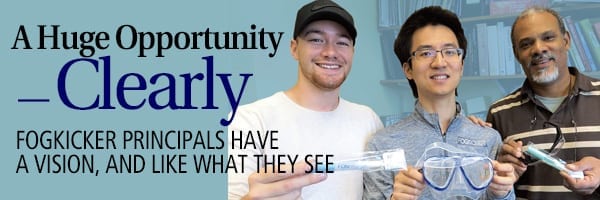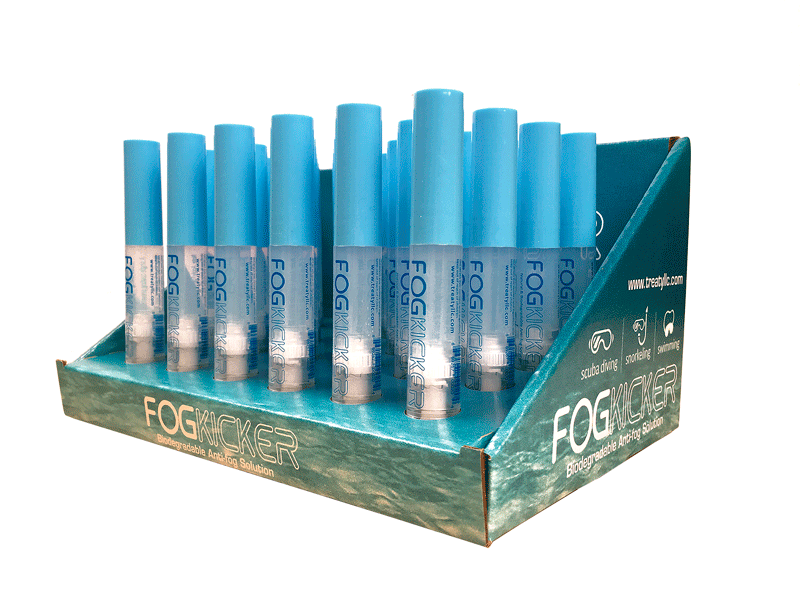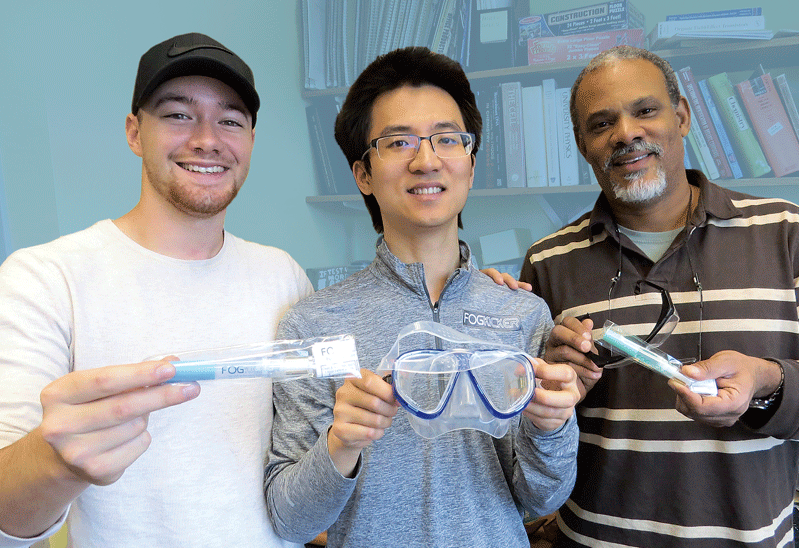
FogKicker Principals Have a Vision, and Like What They See
A Huge Opportunity — Clearly
There’s no word yet on whether the creators of FogKicker will embrace Johnny Nash’s 1972 reggae hit ‘I Can See Clearly Now’ as their theme song, but it would certainly work. The product, developed in the polymer science lab at UMass Amherst, has proven itself successful in keeping a range of surfaces, from scuba masks to bathroom mirrors, clear of fog. Partners Yinyong Li, Marc Gammell, and Kenneth Carter are scaling up their venture, Treaty Biotech LLC, and while their vision of the future isn’t totally clear, it is certainly coming into focus.
They call it ‘big glass.’
That’s the term the principals at Treaty LLC, developers of the product known as FogKicker, summon as they talk about larger surfaces such as car windshields, bathroom mirrors, and shower doors.
And they foresee a day when their product will be in widespread use on all of the above, and more, to clear away annoying — and sometimes dangerous, especially when it comes to those windshields — fog.
We made a strategic decision to go after this niche market, where we knew there was a problem, where there are anti-fogging products out there that work fairly miserably, and where we knew we could gain a foothold.”
But for now, they’re more focused on what would have to be labeled ‘small glass,’ or at least ‘smaller glass,’ as in the goggles used by scuba divers, snorkelers, swimmers, skiers, mountain climbers, and others. And in this realm — large in its own right by any estimation — those who developed FogKicker in the polymer science lab at UMass Amherst can see some clear opportunities, pun obviously intended.
“There are certainly a number of applications for this product — everyone has a bathroom mirror,” said Yinyong Li, who, along with Kenneth Carter, a professor in the Polymer Science and Engineering Department at UMass Amherst, discovered that nanocellouse, a biological material plants use to help them absorb and circulate water, could also be used to solve one of society’s big problems — keeping glass surfaces free of fog.
Cellulose, of course, is used in the production of a number of paper products, said Yinyong, adding that, in many respects, FogKicker acts like an invisible paper towel to absorb moisture and keep glass surfaces clear of fog.
Yinyong, the company’s chief technology officer, who attained his Ph.D. from UMass in 2016; Carter; and third partner Marc Gammell, who recently earned his undergraduate degree at UMass, are making giant strides forward in the process of taking FogKicker from discovery in the lab to successful business venture.
They have succeeded in raising capital, and also in raising the product’s — and the company’s — profile, through appearances like the one late last month on the CNBC reality program Adventure Capitalists, for example.
The video clip shows Gammell and Carter (an experienced diver himself), both clad in FogKicker pullovers, appearing on a dock somewhere with the ocean in the background, making a pitch for their product — and also for what the two called ‘smart capital,’ as well as individuals to join their team.

The creators of FogKicker are in the process of scaling up their venture, focusing first on sports goggles and other smaller glass surfaces.
“We want someone who has industry-specific connections,” Gammell, the company’s CEO, says in the video, referring specifically to the diving market. “Someone who has some serious marketing clout, someone who knows their way around building a brand; we want a real team player that brings that to the table.”
In a nutshell, that short video, which also goes into some detail about the product and how it works, neatly sums up where this company is right now and what it’s doing to get where it wants to go.
It has a product that works — one that those in the diving industry have been quick to embrace, as we’ll see — and a road map of sorts for getting to the next level with small glass and ambitions for doing the same with big glass.
For this issue, BusinessWest talked at length with the FogKicker team about their vision for their product and their company, and how things have come into focus, in every sense of that word.
Glass Act
As they talked with BusinessWest about FogKicker and their plans for it, Yinyong, Gammell, and Carter were getting ready to travel.
Their destination was Orlando and, more specifically, the week-long Diving Equipment & Marketing Assoc. (DEMA) trade show. Armed with a new and vastly improved show booth, the partners were — wait for it — looking to make a splash with their growing portfolio of products.
Or another splash, to be more precise.
Indeed, it was at the 2016 DEMA show in Las Vegas that the partners first caught the attention of the diving community, and in a big way.

The FogKicker principals, from left, Kenneth Carter, Marc Gammell, and Yinyong Li, display their products at one of the many trade shows they’ve exhibited at recently.
“We were met with huge enthusiasm, and seemingly overnight, our product was available all over the world, because this is a worldwide conference, and people were buying cases and cases of it,” said Carter, the company’s chief scientific officer.
This response came, he went on, because FogKicker established itself as a clear (literally) improvement over other methods of keeping scuba masks clear of fog — from saliva to soaps that were already on the market, both of which eventually wash off and lose their effectiveness. “This is one of the first water-resistant anti-fogging coatings that have been produced.”
But to tell this story, we need to go back further, to earlier this decade, when Yinyong and Carter, using funding from the National Science Foundation, started to look at ways that nanocellulose, derived from paper pulp, could be used in electronics.
“Cellulose is one of the most abundant products in the world; it’s the basis of wood, paper, trees, algae, and plants in general,” said Carter. “Paper makers grind it up into a pasty pulp, and they spread it over wires, and that’s how we make paper — it’s essentially just dried cellulose.
“What was discovered a while ago is that, if you keep breaking that pulp down, mechanically breaking it down and chemically treating it, you can get to what’s known as nanocellulose — nanoscopic particles of cellulose,” he went on. “We were playing around with it, and trying to think of other things we could do with nanocellulose.”
The two discovered they could take many common sources of the material, such as waste paper, cotton, or recycled paper, and convert them into nanocellulose. The bigger discovery, as it turned out, came when they placed this material on various surfaces and, in doing so, created completely transparent coating that did not fog up when exposed to humid air or steam.
“Because it’s paper, it’s very absorbent to water — we all know that paper loves water,” Carter explained. “When things fog up, what’s happening is that water vapor in the air is hitting a cooler surface, and it condenses, forming tiny beads of water, which we see as fog.”
When water hits the nanocellulose films, it gets absorbed, said Yinyong, and doesn’t form those beads, thus eliminating fog.
Fast-forwarding through the all-important discovery phase to ensure that the product is unique and the patent-disclosure process, Yinyong made the concept an entry in the 2015 Innovation Challenge at UMass Amherst, and he came away with the $20,000 grand prize.
He also came away with an eventual partner in this fledgling business venture. Indeed, Gammell was another contestant at the Innovation Challenge. He didn’t fare nearly as well with his entry, but he would also have to be considered a winner, because he was so impressed with what Yinyong brought to the table that he asked if he could be a part of it.
“I was pitching my own crazy business idea, and Yingong was pitching FogKicker,” he recalled. “Yingong wound up going to the finals, and I went just to watch him do his extended pitch, and afterwards, I was so pumped up about FogKicker and his work with nanocellulose that I introduced myself and told him I wanted to help him any way I could.”
Things have accelerated at an impressive pace since then, with FogKicker and Treaty Biotech LLC moving on to more innovation and entrepreneurship competitions, including the Venture Well program in Hadley and Valley Venture Mentors’ Accelerator program, and winning some prize money at nearly all of them.
They also took part in the National Science Foundation’s Innovation Corps, or I-Corps, as it’s called, a program that prepares scientists and engineers to extend their focus beyond the university laboratory and move forward with NSF-funded projects ready for commercialization.
“It’s like a boot camp — they scrutinize everything you do,” said Carter, adding that Treaty LLC won $50,000 to do customer discovery.
And those efforts took the partners to Tek-Divers, a Middle Eastern outfit that offers a wide range of recreational diving and extreme deep diving.
“They dive under some of the most extreme conditions out there — so we went to talk to them, realizing, who better could tell us whether we had something interesting than people who put their lives on the line?” said Carter. “And immediately, they loved us; they said, ‘boy, this stuff is great.’ And they bought a lot of it.”
View to the Future
The partners at Treaty LLC have been putting the capital they’ve attained from competitions and other sources to use in the many specific areas covered by that broad term ‘scaling up.’ That process includes everything from prototype development and production (now taking place at a location in Springfield) to marketing, like the DEMA show; from gaining more capital, through a variety of methods, including that Adventure Capital episode, to adding more team members, something the partners expect will happen over the next several months.
Product development was an exercise in listening to the experts and responding to what they said, Yinyong noted, adding that initial thoughts about possibly creating one-use disposable wipes were discarded amid feedback from divers and environmentalists fearful of the ocean being littered with the packages for those wipes.
What emerged instead was a felt-tip-marker-like device that places drops of FogKicker on a surface to be rubbed in. To date, the company has sold roughly 30,000 small bottles of various solutions.
As noted earlier, Treaty Biotech is, for the most part, focused on that ‘smaller glass’ market, and especially the sports-goggle market and the scuba/snorkeling market.
“We thought really hard about what would be best way to roll this out,” said Carter. “Of course, you would sell more volume and more bulk material if you put it in squirt bottles for home use, but how do you even approach that market?
“So we made a strategic decision to go after this niche market,” he went on, “where we knew there was a problem, where there are anti-fogging products out there that work fairly miserably, and where we knew we could gain a foothold.”
Even within that seemingly small niche, the numbers are impressive and the sales potential considerable, said Yinyong, noting that the business plan estimates that there are 14 million scuba divers and snorkelers in the U.S. alone, and maybe 25 million worldwide.
Educating them about their product is important, he said, because many are firmly convinced that anti-fogging products don’t work, or don’t work any better than their own saliva.
The appearance on Adventure Capitalists, a show billed as the outdoor person’s Shark Tank, is expected to help boost efforts in this regard. Contestants make presentations to a panel of investors — all of them involved in sports, business, and investing — who then put those products through their paces, often in harsh conditions.
But there are, of course, much bigger numbers in the ‘big glass’ market, said Gammell, who did some quick math and estimated that there are more than 250 million car and truck windshields in this country alone.
Meanwhile, there are probably 100 million bathroom mirrors within the residential market alone, he said, adding quickly that the commercial market — hotels, motels, gyms, and other segments — is equally potential-laden.
And there are other markets as well, including the huge healthcare field, Gammell noted, adding that all of these markets and others are potentially within the company’s reach.
To reach them, the company and its principals are moving in a number of directions, from an aggressive push for seed funding from investors to talks with contract manufacturers about scaling up production; from a website makeover to a new trade-show booth for the DEMA event and many others to follow.
“Big glass … we could be there in a year,” said Gammell. “And in a year, hopefully we’ll have big accounts with Dick’s Sporting Goods, CVS, Cabela’s, Bass Pro Shops, and others. And we’ll have some hires — we’ll have a bigger team.”
Bottom Line
If you listen to the lyrics from “I Can See Clearly Now,” they include lines you would never, ever hear from aspiring entrepreneurs, such as “I can see all obstacles in my way,” or “I think I can make it now, the pain is gone,” or “all of the bad feelings have disappeared,” or even (and especially) “look all around, there’s nothing but blue skies … look straight ahead, nothing but blue skies.”
Yinyong, Gammell, and Carter certainly know better. They know there are obstacles they probably can’t see, and there are obviously some clouds within that blue sky.
But overall, the future is certainly bright for FogKicker, and there are enormous opportunities for this venture — clearly.
George O’Brien can be reached at [email protected]






